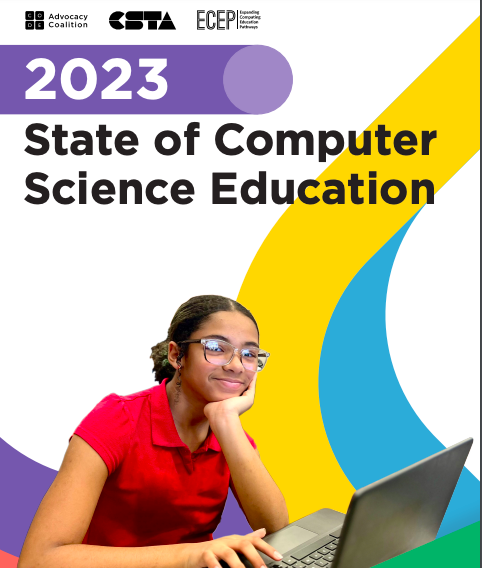The 7th annual report on K-12 computer science in the United States dropped today. It provides an update on national and state-level computer science education policy, including policy trends, maps, state summaries, and implementation data. I had the chance to speak with Sean Roberts, VP of US Strategy from Code.org and get a pre-brief before today’s release. Sean underscores the report’s findings including the significant growth in the number of schools offering computer science courses, emphasizes the importance of foundational computer science education, and outlines the challenges, including the persistent gender gap in the field. Dig in to the whole report here. Scroll down for some takeaways and data highlights.

Key Takeaways:
- Remarkable Growth: The report reveals a substantial increase in the number of schools offering computer science courses across the country since 2018, demonstrating a growing recognition of the subject’s importance.
- Importance of Foundational Education: Foundational computer science education encompasses a focus on programming, algorithms, and broader concepts related to computing. It aims to empower students to be not just consumers but creators of technology, with a deep understanding of its impact on society.
- Gender Gap Challenge: The report addresses the persistent gender gap in computer science participation, with young women representing only around 30% of students in computer science courses. However, states that have made computer science a graduation requirement have seen significant increases in female participation, highlighting the potential for bridging this gap.
- Professional Development for Teachers: To meet the increasing demand for computer science education, many teachers who did not initially specialize in the field are being upskilled. The report emphasizes the importance of supporting existing teachers to provide high-quality computer science education and creating a pipeline of future computer science educators.
- Graduation Requirements: Making computer science a graduation requirement is a complex process that varies by state and district. The report recommends flexible approaches and multi-year implementation pathways to ensure a smooth transition and alignment with existing graduation requirements.
- Future Prospects: The report predicts that, in the next three to four years, more states will make computer science a graduation requirement, leading to increased access for students and the closing of gender gaps in the field. It envisions a future where every K-12 student in the US has exposure to computer science, preparing them for the age of AI and beyond.
Highlights related to access and participation:
• 2023 is the year of the largest growth in the percentage of high schools offering foundational computer science since 2018.
• 57.5% of U.S. public high schools offer foundational computer science (up from 53% last year), but disparities in access persist.
• Rural schools, urban schools, and smaller schools are less likely to offer foundational computer science;
• Black/African American students, Hispanic/Latino/Latina/Latinx students, and Native American/Alaskan students are less likely to attend a school that offers foundational computer science.
• Across 35 states, 5.8% of high school students are enrolled in foundational computer science. • Nationally, Black/African American, Native American/Alaskan, and Native Hawaiian/Pacific Islander students are represented in foundational computer science courses at similar rates as their overall population; however, in many states, disparities exist
Highlights related to state policy adoption:
• Twenty nine states have now adopted at least seven of the ten policies recommended by the Code.org Advocacy Coalition.
• States that have adopted at least seven policies have 73% of their high schools offering foundational computer science, compared with 50% in states that adopted fewer than seven policies.
• Ten states have adopted nine or ten policies: Alabama, Arkansas, Georgia, Idaho, Indiana, Maryland, Nevada, Rhode Island, Tennessee, and Washington.
• North Carolina, North Dakota, and Rhode Island adopted a graduation requirement in computer science.
- Meet the Winners—Dr. Kellie Wilks, Chief Technology Officer, of Ector County Independent School District, TX (ECISD) - April 12, 2024
- Meet the Winners—Prince William County Public Schools (PWCS) in Manassas, Virginia wins the 2024 Community Leadership Award for Digital Equity. - April 12, 2024
- #CoSN2024 Conversation – Tom Ryan Co-Founder K-12 Strategic Technology Advisor Group (NM) - April 10, 2024

